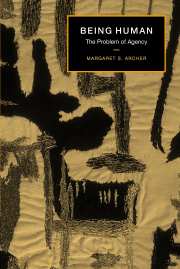Book contents
- Frontmatter
- Contents
- List of figures
- Acknowledgements
- Introduction
- Part I The impoverishment of humanity
- 1 Resisting the dissolution of humanity
- 2 Modernity's man
- 3 Society's being: humanity as the gift of society
- Part II The emergence of self-consciousness
- Part III The emergence of personal identity
- Part IV The emergence of social identity
- Conclusion: the re-emergence of humanity
- Index
2 - Modernity's man
Published online by Cambridge University Press: 22 September 2009
- Frontmatter
- Contents
- List of figures
- Acknowledgements
- Introduction
- Part I The impoverishment of humanity
- 1 Resisting the dissolution of humanity
- 2 Modernity's man
- 3 Society's being: humanity as the gift of society
- Part II The emergence of self-consciousness
- Part III The emergence of personal identity
- Part IV The emergence of social identity
- Conclusion: the re-emergence of humanity
- Index
Summary
The particular interest of the Enlightenment's ‘model of man’ is that it represents a being whose fundamental constitution owes nothing to society. It is this metaphysical individual which we have just seen late twentieth-century thought seeking to demolish and deconstruct by dissolving him as the solute in society's conversation. Although I maintained that some kind of human animal was generally snatched back out of the jaws of textualism, it was one whose rugged individualism had been battered out of him, leaving a frail social dependant, prone to disaggregate into a plurality of discursive ‘quasi-selves’.
Modernity's man was much more like the Clint Eastwood of the eighteenth century, the lone stranger who walked tall through the townships of the western world: the man from nowhere who arrived on the scene ready-made, imposed the order which he taciturnly deemed justified, and strode off into the sunset, unchanged by his encounter. The major question about this stranger was why he should have any concern, however temporary, for the well-being of others who were never discovered to be constitutive of himself? Well, if the justification of moral action in Westerns boiled down to ‘a man's gotta do what a man's gotta do’, the Enlightenment did not entirely disagree with the sentiment, for Modernity's man had to be rational in his doings and was merely expected to be a good deal more articulate in supplying reasons for his moral and political actions.
- Type
- Chapter
- Information
- Being HumanThe Problem of Agency, pp. 51 - 85Publisher: Cambridge University PressPrint publication year: 2000



